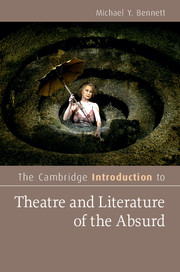Book contents
- Frontmatter
- Dedication
- Contents
- Acknowledgments
- Chapter 1 Introduction: Overview of the absurd
- Chapter 2 Setting the stage
- Chapter 3 The emergence of a “movement”: The historical and intellectual contexts
- Chapter 4 Samuel Beckett
- Chapter 5 Beckett's notable contemporaries
- Chapter 6 The European and American wave of absurdism
- Chapter 7 Post-absurdism?
- Chapter 8 Absurd criticism
- Notes
- Further reading
- Index
- Cambridge Introductions to …
Chapter 2 - Setting the stage
Published online by Cambridge University Press: 05 November 2015
- Frontmatter
- Dedication
- Contents
- Acknowledgments
- Chapter 1 Introduction: Overview of the absurd
- Chapter 2 Setting the stage
- Chapter 3 The emergence of a “movement”: The historical and intellectual contexts
- Chapter 4 Samuel Beckett
- Chapter 5 Beckett's notable contemporaries
- Chapter 6 The European and American wave of absurdism
- Chapter 7 Post-absurdism?
- Chapter 8 Absurd criticism
- Notes
- Further reading
- Index
- Cambridge Introductions to …
Summary
It is possible to argue that the four writers/movements – Alfred Jarry, Franz Kafka, OBERIU, and Antonin Artaud – discussed in this chapter are a part of the absurd literary canon. On the one hand, these writers do form a clear lineage and line of influence towards the literary absurd that emerged in the middle of the twentieth century. However, on the other hand, it can be anachronistic to retroactively go back to include these writers as absurdists. In other words, (especially) these writers were writing over the course of decades somewhat in isolation (in that these four did not influence each other). The Theatre of the Absurd, as Esslin calls it, and its contemporary absurd literature in fiction and poetry are clearly indebted to the writers discussed in this chapter, and most of them are indirect influences (maybe with the exception of Kafka, who was a more direct and stated influence). The writers in this chapter are no doubt the forefathers of the literary absurd: stated as an oversimplification (but helpful nonetheless), it can be said that the literary absurd of the 1950s to the 1970s is the combination of the noteworthy elements of each of these writers. In short, each of these writers contributed a key element of the absurd to the world of literature: Alfred Jarry rebelled against realism, was really the first avant-garde playwright, and created pataphysics that influenced the Dadaists and Surrealists and an indirect line to Genet and Ionesco; Franz Kafka created the “strange,” “absurd situation,” but told very straightforward stories, and did not experiment with language; the OBERIU poets took up linguistic nonsense to, “[destroy the protocols] of semantic coherence and linguistic realism” and Antonin Artaud's theatre created a theatre of anti-realism in order to shed light on the real. Despite these influences, it would also be a mistake to categorize them or group them together with the literary absurd, as each of these writers also displays so many elements in their respective literary works that the literary absurd of the mid-twentieth century revolted against.
Alfred Jarry
Born in 1873, Alfred Jarry came into prominence in artistic/literary circles in Paris when he was just 23 years old with the premiere of his 1896 play, Ubu Roi (translated as King Ubu or Ubu the King).
- Type
- Chapter
- Information
- Publisher: Cambridge University PressPrint publication year: 2015

